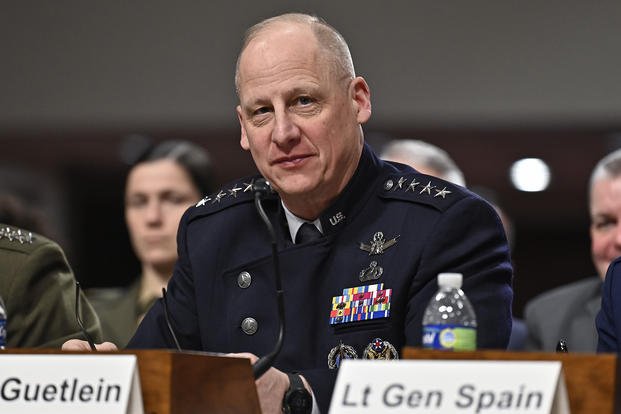Trump Names Space Force Vice Chief to Oversee Golden Dome Missile Defense Project

President Donald Trump has named a four-star Space Force[1] general to oversee the development of Golden Dome -- the massively expensive space-based missile defense system promised during the first days of his second term.
During a press conference in the Oval Office on Tuesday, Trump named Gen. Michael Guetlein, the vice chief of space operations, as the "direct reporting program manager" for the effort to build a missile shield over the U.S.
"He has an unmatched background in missile warning technology and defense procurement," Trump said during the announcement. "Gen. Guetlein also knows that we need to move fast. No one is more qualified for this job."
Read Next: Secretary Noem Orders Coast Guard to Cut 25% of Flag Officer Positions[2]
Trump's announcement did not provide many specific details regarding the companies and technologies that would be used to create the proposed space-based defense system, which the administration says would be capable of stopping all types of attacks on American soil including from ballistic, hypersonic and even nuclear missiles.
Inspired by Israel's Iron Dome defense system, which protects against short-range missile threats for a country roughly the size New Jersey, Trump made a bold promise to create America's own system. He issued an executive order in the first month of his second term making it a top priority, and he claims it should be complete by the end of his time in office.
"This design for the Golden Dome will integrate with our existing defense capabilities and should be fully operational before the end of my term," Trump said. "So we'll have it done in about three years."
Trump claimed that a design had been selected and that it will cost roughly $175 billion to complete. That is less than the potential $542 billion to $831 billion high-end cost for Golden Dome over next 20 years projected by the Congressional Budget Office earlier this month[3].
In the Oval Office, Trump touted the $25 billion proposed for Golden Dome in a massive funding bill being pushed through Congress as a down payment of sorts for the project. Notably, that bill as a whole is facing opposition from Republicans and Democrats alike.
Guetlein, a four-star general who has served as the Space Force's second top officer since late 2023, thanked Trump for the new role and doubled down on support for the project.
"Golden Dome is a bold and aggressive approach to hurry up and protect the homeland from our adversaries," Guetlein said. "We owe it to our children and our children's children to protect them and afford them a quality of life that we have all grown up enjoying. Golden Dome will afford that."
Gen. Chance Saltzman, the Space Force's top uniformed leader, praised Guetlein's appointment in a statement on social media.
"No one is more uniquely qualified to make Golden Dome a reality than my teammate and brother-in-arms, Gen. Michael Guetlein," Saltzman said. "Congrats, Mike!"
Spokespeople for the Department of the Air Force[4] did not immediately return a request for comment asking how Guetlein will balance the new role with his existing duties.
Todd Harrison, a senior fellow at the American Enterprise Institute think tank who focuses on defense and space policy, said Guetlein was "an excellent choice and the ideal person to be leading an effort this complex."
Guetlein previously served as the head of Space Systems Command, deputy director and Air Force element commander of the National Reconnaissance Office, and was a program executive at the Missile Defense Agency, according to his biography.
Harrison added that besides naming the well-qualified general, there were many more details about the Golden Dome project that needed to be made public.
"Other than naming Guetlein, the whole event was disappointingly short on specifics," Harrison said.
Related: Options for Trump's Space-Based 'Golden Dome' Missile Defense Shield Head to Hegseth for Approval[5]
© Copyright 2025 Military.com. All rights reserved. This article may not be republished, rebroadcast, rewritten or otherwise distributed without written permission. To reprint or license this article or any content from Military.com, please submit your request here[6].

